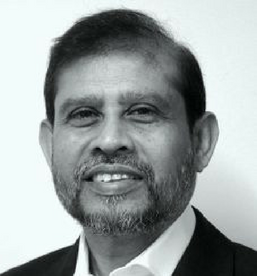Not Abhaya Induruwa. While other academics in Sri Lanka were fighting for the basic “blackboard and chalk” type resources in the late 1980s, he leveraged his unique position as head of a new computing department to bring data communications—and eventually the Internet—to the embattled island nation.
The first student to graduate with a First Class Honours degree in electrical engineering from the University of Sri Lanka (now the University of Moratuwa), Induruwa said he got his first taste of computing in the 1970s when the school installed an IBM mainframe system with punched card input. He was introduced to even larger systems, “with remote job entry and all that,” while working on his PhD at the Imperial College in London.

He returned to Sri Lanka in 1980, and three years later was appointed to set up the first computer science and engineering department at the University of Moratuwa, the only department of its kind in a Sri Lankan university.
“That is how everything began,” he explained recently to the Internet Hall of Fame.
Although most of even his close colleagues didn’t feel the Internet was necessarily a requirement of higher education claiming, “there are more basic things that people needed.” He said he had an energetic young staff along with a Japanese grant to build the department.
With those resources, he pioneered academic and research networking and Internet deployment in Sri Lanka. He also proposed Lanka Experimental Academic & Research Network (LEARN), to provide data communications throughout the island in 1989.
The next year he deployed LEARNmail in 1990, the first Internet based email service in Sri Lanka that originally was based on a dial-up system that connected to a server in the United States three times a week to upload and download mail.
“When the usage became high,” he said, “we then began dialing three times a day. I think that was probably the biggest thing in convincing people of the power of having a network to connect and share information and resources.”
Although the country was still in the midst of its longstanding conflicts, he convinced the government to provide seed funding and established connections with academics at universities in the troubled northern part of the country.
“Unfortunately, we had civil war,” he said. “On the other hand, we were fortunate because despite the war happening, the country made progress. It was not like other countries where the infrastructure was totally destroyed. … and because we were academics, we were working toward the same goals.”
Ironically, he noted, the biggest challenge was not the war or funding, but dealing with the government telecommunications department that had little or no prior experience with packet switched data communications.
“This was an era when we did not have fiber optic connectivity in Sri Lanka. Somehow we managed to convince them to buy three 64-kilobit radio links,” he said. “So basically they bought the stuff and said, ‘Ok, here you are, it’s all yours.’ They helped us to commission them to get the links working. That was interesting. Eventually we were able to connect the University of Moratuwa to the University of Colombo and to the Open University of Sri Lanka thus forming the first IP Wide Area Network in Sri Lanka in 1994.” LEARN was connected to the global Internet in 1995.
Today, LEARN connects all universities and research centers in the nation. And his efforts paved the way for the establishment of commercial Internet services in Sri Lanka in 1995 with the help of private investors and the USAID.
Induruwa became a founding member of the Internet Society in Kobe in 1992 and remained head of the computer science and engineering department at the University of Moratuwa until he returned to the United Kingdom in 1998, although he still returns to his homeland regularly to give talks at national ICT conferences and teach in the universities.
In 2014, he was inducted into the Internet Hall of Fame, as a ‘Global Connector.’
He currently is director of the Centre for Cybercrime and Security Innovation in the School of Law, Criminal Justice and Computing, Canterbury Christ Church University, where he researches and teaches on the topics of cyber forensics and the prevention of security breaches, with a particular emphasis on mobile phones and the Internet of Things.
“My line of argument is that the Internet is a fantastic thing for probably 99.5 percent of the user population,” he said. “But there is this small minority who will create problems for everyone. This is going to exacerbate with the advent of the Internet of Things where billions of devices get connected to the Internet. Some of the less secure IoT devices will become an easy target for hackers and provide attack surfaces involving millions, if not billions, of compromised IoT devices. When something bad happens we have to investigate, and forensics will be an area that is quite important. Forensics is important after the event, but we also have to prevent attacks before they happen so security is very important too.”
